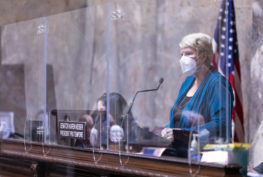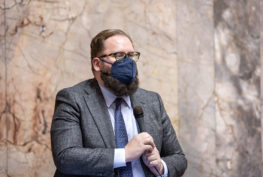FOR IMMEDIATE RELEASE: Jan. 18, 2022
Four Democratic legislators from the Washington state House and Senate have proposed twin joint resolutions – HJR 4209 and SJR 8210 – that would amend the Washington State Constitution by adding a Green Amendment to recognize every Washingtonians’ right to a clean and healthy environment.
The prime sponsor in the House is Rep. Debra Lekanoff (D-Bow) with second sponsor Rep. Liz Berry (D-Seattle), partnering with the Senate prime sponsor Sen. Mona Das (D-Kent) and second sponsor Sen. Liz Lovelett (D-Anacortes).
“If incorporated into the constitution, this amendment would ensure that the rights to clean water and air, and healthy environments, are given the highest legal protection available in our state,” said Lekanoff, who first introduced this proposal during the 2021 legislative session. “Right now, people in Washington have rights to free speech and freedom of religion but not to healthy water and air. That is an oversight that this amendment will remedy.”
“Washington State is a national leader in policy, laws and investments that ensure we all can live our dream for a healthy way of life, a prosperous economy, and jobs that sustain our families, homes and communities. The Green Amendment is a bold statement that reflects the values of our constituents across the state, and that is that every Washingtonian, regardless of your political party, gender, color, religion or who you love, deserves clean air, cool and clean water, and land for the humans and resources who call this great state home,” added Lekanoff.
Establishing a Green Amendment would ensure that Washingtonians have legal redress when their rights to a clean and healthy environment are violated. As an enforceable environmental right, the Washington Green Amendment would also strengthen environmental justice by ensuring all communities – regardless of race, ethnicity or income – have the same rights to clean and healthy environments and the duty of government to protect all communities equitably.
The Green Amendment would encourage better environmental decision-making at all levels of government, including consideration of the cumulative impacts of pollution, and will prevent conditions in which a community’s water, air, or soil becomes too contaminated to support healthy lives and a healthy economy. Finally, the Green Amendment would help protect natural environments and landscapes sacred to indigenous communities, as well as honor the traditional cultural connection to healthy natural resources.
“I want to thank our state’s indigenous community – especially my colleague, Rep. Lekanoff – for leading this work not only this session, not only last session, but for generations,” said Das, who has tackled environmental sustainability and single-use plastic pollution during her time in public office.
“Our Native American community members have always fought for this right, for all of us, to a thriving environment. I’m honored to be part of this effort to guarantee us all the right to pure water, clean air, healthy ecosystems, and a Washington that values and protects them. Let’s get this done this year so that every year to come is a healthier, better one for all of us.”
“As legislators, it is our responsibility to care for and leave Washington state a better place for our children and for future generations,” said Lovelett. “Passing a Green Amendment is a crucial step towards that goal and will provide transformative environmental protection for residents and the state alike, while also building a powerful legacy that we can be proud of.”
“As a mom of two young children,” said Berry, “one of the most powerful elements of this amendment to me is that it will not only ensure that our elected leaders work to protect our natural resources now, but also for future generations to come.
The Green Amendment was modeled after the Environmental Rights Amendment of the Pennsylvania Constitution, which was successfully used to challenge legislation that opponents argued weakened environmental protections in the Pennsylvania Oil and Gas Act. The state of New York also voted to amend its constitution to include environmental rights in November of 2021, which voters approved by 69% of the vote. Legislators in New Mexico, Arizona, Hawaii, New Jersey, Delaware, Vermont, Iowa, West Virginia, Maine, Maryland and Kentucky are also advancing proposals.
“Not just any language added to a constitution will give environmental rights the same high protection as that given to other fundamental rights like free speech and freedom of religion – there are essential elements needed,” said Maya van Rossum, founder of the National Green Amendments for the Generations movement.
“Constitutional Green Amendments ensure the highest constitutional protection by including a number of fundamentally important elements such as placement in the constitution’s bill of rights; self-executing strength; application to all levels of government; and explicit inclusion of environmental qualities essential to healthy lives such as clean water and air, a stable climate, and equitable protection across all communities.”
As an amendment to the state constitution, the Green Amendment requires a two-thirds majority vote in each house of the Legislature. Once through the Legislature, the Green Amendment would be placed on the ballot in the next general election, allowing the people of Washington the opportunity to vote on whether environmental rights should be protected by the state constitution.





